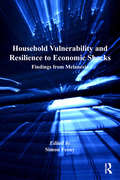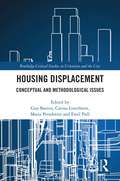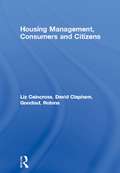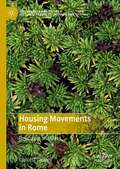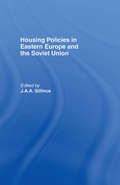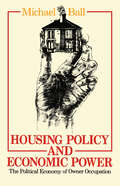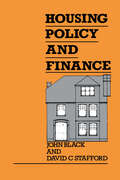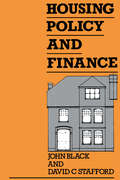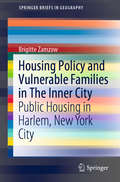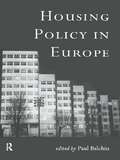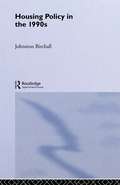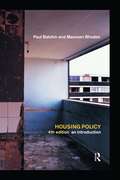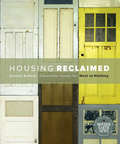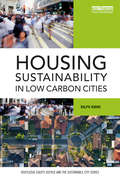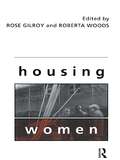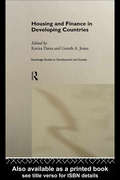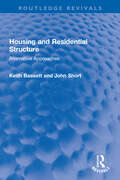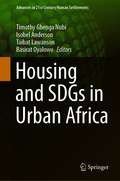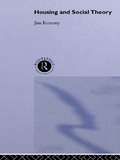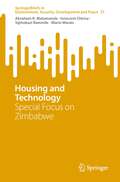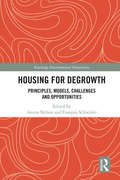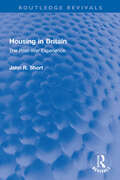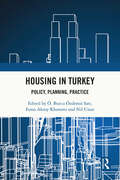- Table View
- List View
Household Vulnerability and Resilience to Economic Shocks: Findings from Melanesia (Economic Geography Series)
by Simon FeenyFocusing on the vulnerability and resilience to economic shocks at the household level, this book draws on extensive research activities carried out in two Melanesia countries: the Solomon Islands and Vanuatu. In particular, it identifies the household impacts of the recent food, fuel and economic crises. The contributors also examine resilience by identifying how households responded to these recent economic events in order to cope with their impacts. Findings indicate that households are vulnerable to a range of shocks and often struggle to cope with their impacts. Shocks are making it harder for households to meet their basic needs. Households in Melanesia are facing increasing demands for money, in particular for school fees, basic foodstuffs and customary obligations. Concurrently, there are limited domestic opportunities for formal employment. Traditional social support networks are strong and are an important form of resilience. However, there is evidence that they are disintegrating. Of particular focus are the gendered impacts. Women are found to bear a disproportionate share of the burden in adjusting to household shocks. The authors highlight key areas in which public policy and development programmes can reduce household vulnerability and increase their resilience to future economic shocks.
Housing Displacement: Conceptual and Methodological Issue (Routledge Critical Studies in Urbanism and the City)
by Guy BaetenThis book examines reasons, processes, and consequences of housing displacement in different geographical contexts. It explores displacement as a prime act of housing injustice – a central issue in urban injustices. With international case studies from the US, the UK, Australia, Canada, India, Spain, Denmark, Sweden, and Hungary, this book explores how housing displacement processes are more diverse and mutate into more new forms than have been acknowledged in the literature. It emphasizes a need to look beyond the existing rich gentrification literature to give primacy to researching processes of displacement to understand the socio-spatial change in the city. Although it is empirically and methodologically demanding for several reasons, studying displacement highlights gentrification’s unjust nature as well as the unjust housing policies in cities and neighborhoods that are simply not undergoing gentrification. The book also demonstrates how expulsion, though under-researched, has become a vital component of contemporary advanced capitalism, and how a focus on gentrification has hindered a potential focus on its flipside of ‘displacement’, as well as the study of the occurrence of poor cleansing from a long-term historical perspective. This book offers interdisciplinary perspectives on housing displacement to academics and researchers in the fields of urban studies, housing, citizenship, and migration studies, interested in housing policies and governance practices at the urban scale.
Housing Management, Consumers and Citizens
by David Clapham Liz Caincross Robina GoodladTenant participation has grown substantially over the last decade, following government legislation, advice from professional bodies and development agencies, and promotion by all major political parties. On few housing issues is there such concensus. Yet, in practice, it is obvious that participation can mean very different things in different contexts.This book explains why this is the case, and examines the growth of participation in the context of changes in the role of local authorities and their relationship with their electorates. These issues are examined in the first part of the book, which sets the context for exploring the roles of housing managers, councillors, tenants and tenant's associations in the second part. The book argues that the rise in arrangements for tenant participation masks considerable differences in the role played by tenants in different areas. These differences raise questions about the nature of power in the tenant-landlord relationship and more generally in the relationship between local government, citizens and consumers. These issues are examined in the final, third, part of the book.
Housing Market Response to Sea-Level Rise in Florida (Coastal Research Library #37)
by Risa Palm Toby BolsenSouth Florida continues to attract new residents despite its susceptibility to sea-level rise. This book explores the views of real estate agent with respect to how prospective homebuyers assess the risk of flooding. It reports on their observations as to whether house prices are stagnant or falling in coastal areas vulnerable to flooding, and their conclusions after working with prospective homebuyers as to whether coastal south Florida is a good place to find a home or, alternatively, a risky investment in a place that will eventually be submerged by rising seas. The book reports on a 2020 survey of real estate agents and concludes that it is not clear that the housing market has integrated flood risk either into reduced demand for housing or in reduced prices for houses susceptible to flooding. These conclusions have important implications for understanding how the risks of climate change and sea-level rise are reflected in the housing market both now and in the near-term future.
Housing Movements in Rome: Resistance and Class (Alternatives and Futures: Cultures, Practices, Activism and Utopias)
by Carlotta CaciagliThis book explores contemporary challenges of housing movement organizations, looking specifically at the case of Rome, Italy. The work identifies conditions that allow the re-composition of a class of housing dispossessed and, consequently, the features of its action in urban spaces. The book offers fresh analytical perspectives to understanding contemporary urban transformation via new spatial and strategic approaches. In striking detail, Carlotta Caciagli shows how space is a crucial variable in shaping the strategies that allow for the politicisation of a movement’s social base. She illustrates how new spatial configurations of urban space result from unique struggles of the recomposed collective subject. Most notably, three main conceptual tools are introduced to disentangle the relationship between the recomposed precarious class and space: “the spatial opportunity structure”, “configurations of strategies” and “educational sites of resistance”.
Housing Policies in Eastern Europe and the Soviet Union
by J. A. SillinceHousing has enjoyed a high place on the agendas of most socialist countries. However this place has not been undisputed and this book examines the internal and external forces which have influenced housing under central planning.
Housing Policy and Economic Power: The Political Economy of Owner Occupation
by Michael Ball Professor Michael BallPublished in 2002, Housing Policy and Economic Power is a valuable contribution to the field of Human Geography.
Housing Policy and Finance
by David Stafford John BlackThis book provides a comprehensive introduction to housing policy and finance in Britain. It describes changes in the condition and tenure of housing in the post-war period, and contrasts the massive investment in house building and improvement with allegations that housing conditions are deteriorating. It describes the rise of the public housing sector and the slight decline in the face of the Thatcher government's policy on council house sales, which followed. The book thus provides a background for the development of housing policy over the next decade.
Housing Policy and Finance
by David Stafford John BlackThis book provides a comprehensive introduction to housing policy and finance in Britain. It describes changes in the condition and tenure of housing in the post-war period, and contrasts the massive investment in house building and improvement with allegations that housing conditions are deteriorating. It describes the rise of the public housing sector and the slight decline in the face of the Thatcher government's policy on council house sales, which followed. The book thus provides a background for the development of housing policy over the next decade.
Housing Policy and Vulnerable Families in The Inner City: Public Housing in Harlem, New York City (SpringerBriefs in Geography)
by Brigitte ZamzowThis book provides insights in how the lack of coherent social policy leads to the displacement of vulnerable low-income families in inner-city neighborhoods facing gentrification. First, it makes a case for how social policy by its racist setup has failed vulnerable families in the history of U.S. public housing. Second, it shows that today’s public housing transformation puts the same disadvantaged socio-economic clientele at risk, while the neighborhoods they call their homes are taken over by gentrification. It raises the powerful argument that the continuing privatization of Housing Authorities in the U.S. will likely lead to greater income diversity in formerly neglected neighborhoods, but it will happen at the expense of vulnerable families being displaced and resegregated further outside the city, if no regulatory planning measures for their protection are initiated by the government. By providing a solid empirical portrait of public housing in New York City’s Harlem, this book provides a great resource to students, academics and planners interested in gentrification with specific concern for race and class.
Housing Policy in Europe
by Paul BalchinHousing Policy in Europe provides a comprehensive introduction to the economic, political and social issues of housing across the continent. The changing policy and practice of housing in fifteen countries from across Northern, Western, Southern and Central Europe are described, analyzed and compared. The book explains why different systems of tenure are dominant in different groups of countries, and the extent to which housing policies within these countries conform to different welfare systems. It reveals how owner-occupation has taken over from social housing as the chosen system of tenure and how this reflects a political and economic shift, from social democracy or communism to neo-liberalism across Europe.
Housing Policy in the 1990s
by Johnston BirchallHousing Policy in the 1990s explores the deluge of Conservative legislation of the late 1980s and examines what its effects will be during this decade and into the next century. The contributors discuss and clarify the main aims of the government re-structuring of social strategy and assess its effects on British housing.
Housing Policy: An Introduction
by Maureen Rhoden Paul BalchinNow in its fourth edition, this textbook has been completely revised to examine the current state of housing policy in the UK. Exploring developments in housing policy made since Labour's 1997 electoral victory, the book addresses current issues including the 'brownfield versus greenfield' debate; the phasing out of renovation grants; the transfer of local authority housing to registered social landlords; boom, slump and boom in the owner-occupied sector.Other topics addressed range from regional policy and housing across the UK, to social exclusion, community care and homelessness.
Housing Reclaimed
by Jessica KellnerHousing is a fundamental human right. For most of human history, our homes were built by hand from whatever local materials were available. However, since the Industrial Revolution, most housing has become little more than quickly constructed, mass-produced, uniform boxes. At the same time, the invention and standardization of the thirty-year mortgage and our ever-increasing reliance on credit has come to mean that most of us never own our homes outright.Housing Reclaimed is a call to arms for nonconventional home builders. It examines how technological advances, design evolution, and resourceful, out-of-the-box thinking about materials and efficiency can help us meet the challenge of building affordable, environmentally friendly, beautiful, and unique homes. Focusing on the use of salvaged and reclaimed materials, this inspirational volume is packed with case studies of innovative projects including:*Phoenix Commotion-working together towards low-income home ownership through sweat equity and 100 percent recycled materials*HabeRae-revitalizing neighborhoods by creating urban infill using modern technology and sustainable and reclaimed materials*Builders of Hope-rescuing and rehabilitating whole houses slated for demolitionThese projects and others like them demonstrate that building one's own home does not have to be an unattainable dream. This beautifully illustrated guide is a must-read for anyone interested in creating quality zero- or low-debt housing, reducing landfill waste, and creating stronger communities.Jessica Kellner is the editor of Natural Home and Garden magazine and a passionate advocate of using architectural salvage to create aesthetically beautiful, low-cost housing.
Housing Sustainability in Low Carbon Cities (Routledge Equity, Justice and the Sustainable City series)
by Ralph HorneHousing affordability, urban development and climate change responses are great challenges that are intertwined, yet the conceptual and policy links between them remain under-developed. Housing Sustainability in Low Carbon Cities addresses this gap by developing an interdisciplinary approach to urban decarbonisation, drawing upon more established, yet quite distinctive, fields of built environment policy and design, housing, and studies of social and economic change. Through this approach, policy and practices of housing affordability, equity, energy efficiency, resilience and renewables are critiqued and alternatives are presented. Drawing upon international case studies, this book provides a unique contribution to interdisciplinary urban and housing studies, discourses and practices in an era of climate change. This book is recommended reading on higher level undergraduate and taught postgraduate courses in architecture, urban studies, planning, built environment, geography and urban studies. It will also be directly valuable to housing and urban policy makers and sustainability practitioners.
Housing Women
by Rose Gilroy Roberta WoodsFirst Published in 2004. Routledge is an imprint of Taylor & Francis, an informa company.
Housing and Finance in Developing Countries (Routledge Studies in Development and Society #Vol. 7)
by Gareth Jones Kavita DattaThis book explores the linkages between formal and informal housing finance drawing upon the lessons of NGO and micro-finance practices. Both public and private formal finance institutions have experienced great difficulty in lending below a middle-income client group, and are often reluctant to lend for the purpose of housing at all. This failure of formal finance to filter down to low-income households, and in particular to women, has led various NGOs and community groups to create and adopt innovative finance programmes, such as informal savings banks and credit rotating schemes. The authors critically assess the impact of theses schemes, and evaluate links between gender, housing and finance.
Housing and Residential Structure: Alternative Approaches (Routledge Revivals)
by John Short Keith BassettFirst published in 1980, Housing and Residential Structure was written to take stock of the many changes that had recently taken place in explanatory approaches to housing markets and residential structure. The book is divided into three parts. Part One focuses on the demand-orientated approaches of human ecology and neo-classical economics. Part Two discusses the institutional approaches with reference to an analysis of private and public sector housing in Britain, drawing on illustrative material from North America and France to aid the comparative analysis of institutional structures. Part Three is devoted to an evaluation of the Marxist approaches to housing and residential structure from Marx and Engels to Castells and Harvey.
Housing and SDGs in Urban Africa (Advances in 21st Century Human Settlements)
by Timothy Gbenga Nubi Isobel Anderson Taibat Lawanson Basirat OyalowoThere is a dearth of collections of scholarly works dedicated wholly to African issues, that comes out of the work done by African scholars and practitioners with both African collaborators and from elsewhere. This volume brings together scholarly works and thoughts that cut across and intertwine the tripods-environment-consciousness, socially just development and African development into options that could deliver on the promise of the SDGs. The book project is an initiative of the Centre for Housing and Sustainable Development at the University of Lagos, which realized the gap in ground research linking the housing sector with the SDGs in African cities. This book therefore presents chapters that explore the interconnections, interactions and linkages between the SDGs and Housing through research, practice, experience, case-studies, desk-based research and other knowledge media.
Housing and Social Change in Europe and the USA: Michael Ball, Michael Harloe, And Maartje Martens
by Michael Harloe Ball Michael Maartjie MartensFirst published in 1988. This book argues that there is a growing structural crisis in the provision of housing in advanced capitalist countries and that the steady improvement in housing conditions since 1945 is unlikely to continue. The dilemmas facing housing policy makers can no longer be seen as concerned just with distributional questions but with problems generated by the restructuring of key elements of housing provision, including private housing finance and the housebuilding industry. It looks at housing markets, housing policies and specific institutions connected with housing provision in many advanced capitalist countries, including Britain, the USA, France, West Germany, the Netherlands and Denmark. It considers the different sectors and the changes taking place there, using case study material where appropriate to support its varied and convincing arguments.
Housing and Social Theory
by Jim KemenyStudies in housing have often concentrated on an abstract institutionalised approach isolated from the broader base of the social sciences. This book is the first to treat housing as a subject of social theory. It provides a critique of current research and theorises housing in relation to political science, social change and welfare developing a case study to illustrate these applications. By being sometimes controversial, this book will stimulate debate among housing theorists and sociologists alike. The Author is currently Senior Research fellow at the Swedish Institute for Building Research and Docent in Sociology at Uppsala University. He has written widely on Housing, Urban Studies and Sociology and his books include THE MYTH OF HOME OWNERSHIP and THE GREAT AUSTRALIAN NIGHTMARE.
Housing and Technology: Special Focus on Zimbabwe (SpringerBriefs in Environment, Security, Development and Peace #37)
by Innocent Chirisa Abraham R. Matamanda Siphokazi Rammile Mario MaraisThe housing and human settlement sector is fast changing, and technology is making it more complex than ever before. With reference to Zimbabwe, a developing country in Southern Africa, the essence of this book is to bring out housing as an issue within the technology debate and practice. The following themes emerge from the 6 chapters in the book: • The characterisation and conceptualisation of housing and technology and the nexus of both • The complexity of housing challenges and the problems governments face in providing adequate housing, especially for the poor • Diverse practices in housing construction through the application of different typologies of technology • Assessment of the feasibility of technologies in housing development in Zimbabwe by mirroring them against global experiences. • Discussion of alternative policy approaches that may guide technology integration in housing development. This book will excite scholars and practitioners in urban and development studies, construction project management, urban sociology, geography, real estate together with policymakers and government officials.
Housing for Degrowth: Principles, Models, Challenges and Opportunities (Routledge Environmental Humanities)
by Anitra Nelson François Schneider‘Degrowth’, a type of ‘postgrowth’, is becoming a strong political, practical and cultural movement for downscaling and transforming societies beyond capitalist growth and non-capitalist productivism to achieve global sustainability and satisfy everyone’s basic needs. This groundbreaking collection on housing for degrowth addresses key challenges of unaffordable, unsustainable and anti-social housing today, including going beyond struggles for a 'right to the city' to a 'right to metabolism', advocating refurbishment versus demolition, and revealing controversies within the degrowth movement on urbanisation, decentralisation and open localism. International case studies show how housing for degrowth is based on sufficiency and conviviality, living a ‘one planet lifestyle’ with a common ecological footprint. This book explores environmental, cultural and economic housing and planning issues from interdisciplinary perspectives such as urbanism, ecological economics, environmental justice, housing studies and policy, planning studies and policy, sustainability studies, political ecology, social change and degrowth. It will appeal to students and scholars across a wide range of disciplines.
Housing in Britain: The Post-War Experience (Routledge Revivals)
by John R. ShortFirst published in 1982 at a time when housing policy featured prominently in the press and in political debate, Housing in Britain was written to provide an authoritative review of housing in Britain. The book is a comprehensive introduction to the major policy shifts from 1945 to the year of publication. It explores the many aspects of ‘housing’ as a matter of state policy; as a commodity with a certain market for its sale and exchange; as an essential item, with rules regulating access and eligibility; and as a vital element in the reproduction of social life. Particular attention is paid to the institutions involved within the British housing market, and the redistributional consequences of housing-market processes and state housing policy. Housing in Britain will appeal to those with an interest in the history of British housing policy and debates, and the history of social policy in Britain.
Housing in Turkey: Policy, Planning, Practice
by Ö. Burcu Özdemir SarıThis book presents the major features of the path that Turkish housing system has followed since 2000. Its primary focus is to build an understanding of housing in Turkey from the policy, planning, and implementation perspectives in the 21st century, interwoven with the effects of neoliberalism. It investigates the social, spatial, and economic outcomes of the shift in philosophy and behaviour by the government regarding housing. The book discusses failures in housing outcomes as government failures, incorrect or inefficient regulations, lack of regulations, and lack of monitoring of the policy outcomes. Chapters on the housing-economy relationship, financialization and indebtedness, housing market experiences based on case studies, and the housing policy provide the reader with an opportunity to observe different outcomes in a world where housing challenges and issues are similar. This book will be of interest to urban planners, political scientists, and sociologists, as well as undergraduate/graduate students and housing sector experts all over the world who are interested in the various dimensions of the housing problem.
